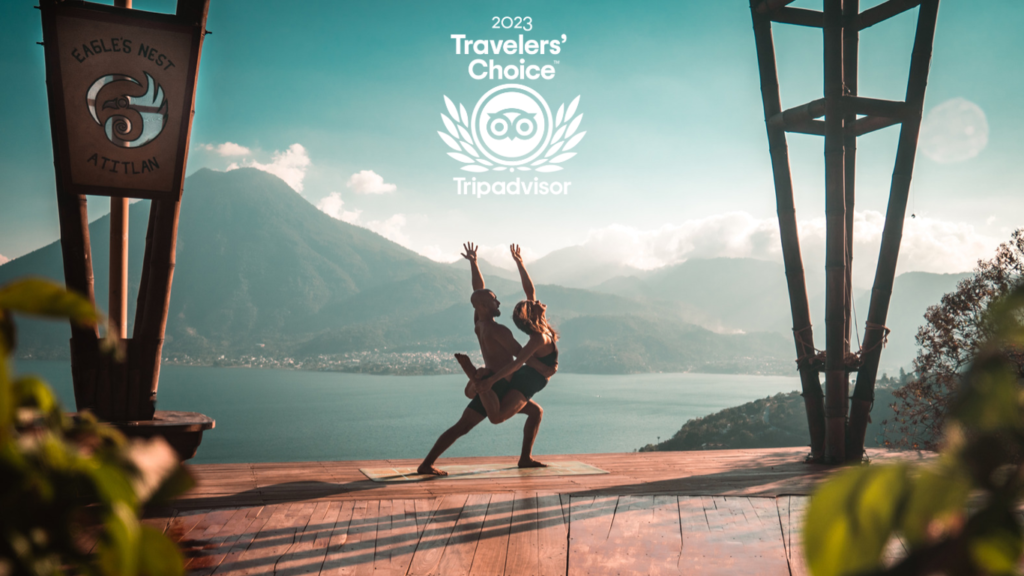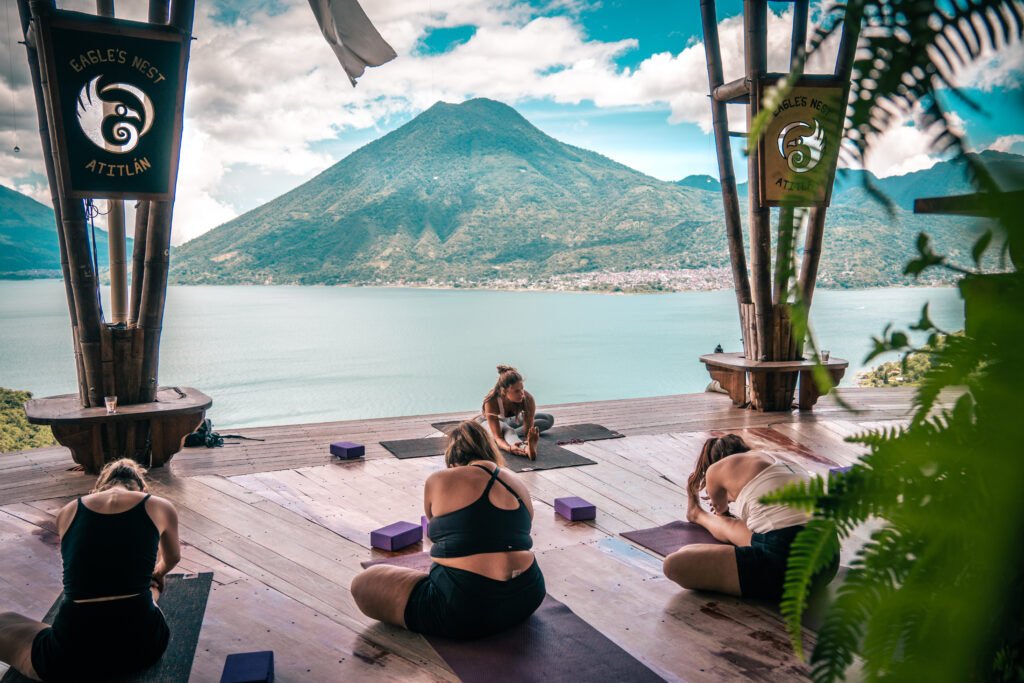Unveiling the Oasis of Serenity: Discover 5 Powerful Eco-Friendly Yoga Retreats

The Rise of Sustainable Well-being: A Closer Look at Eco-Friendly Yoga Retreats
The intersection of wellness and environmental stewardship is at the forefront of modern self-care practices. Eco-Yoga Sanctuaries are pioneering in this domain, offering settings that amalgamate the pursuit of inner peace with the love for the Earth. These sanctuaries are not just about yoga; they’re about living in accordance with eco-friendly principles that nourish both the individual and the planet. By adhering to practices that reduce environmental impact, these retreats promote a lifestyle that aligns with the mindfulness fostered through yoga, creating a full-circle wellness experience.
Balancing Body and Nature: The Core Values of Eco-Friendly Yoga Retreats
In recent years, the pursuit of harmony between one’s well-being and the environment has gained significant momentum. Eco-friendly yoga retreats embody this union, providing a respite for both the body and the planet. At the heart of these sanctuaries is the philosophy of minimal environmental impact, coupled with maximal personal growth. Participants are immersed in a setting where sustainable practices are not just encouraged but seamlessly integrated into the daily routine, offering a profound connection with nature that enhances the holistic yoga experience.
Evaluating the Environmental Impact of Your Yoga Escape
Selecting the right eco-yoga retreat requires attention to the establishment’s ecological footprint. It is essential to consider factors such as energy consumption, waste management, and resource conservation. Prospective yogis should seek out retreats that prioritize renewable energy sources, implement recycling and composting programs, and use organic, locally sourced food. By making a responsible choice, one supports environmentally conscious businesses and fosters the preservation of natural surroundings, ensuring that these retreats remain havens of tranquility for generations to come.
Embarking on a Green Journey: How Eco-Friendly Yoga Retreats Enhance Your Yoga Experience
Eco-retreats offer a distinctive and enriched yoga experience, set against the backdrop of conscientious environmental practices. These retreats are about more than relaxation; they educate and inspire attendees to embrace a lifestyle that balances personal wellness with ecological sustainability. The green initiatives ingrained within their operations serve as a live-action example of how one can maintain an eco-friendly lifestyle. Such retreats amplify the yoga journey, imbuing it with a deeper sense of purpose and a greater connection to the natural world.
Choosing the Eco-Friendly Yoga Retreats: What to Look for in a Sustainable Retreat
When planning an eco-conscious yoga retreat, a thorough assessment of the retreat’s sustainability credentials is vital. Look for certifications from reputable environmental organizations, a clear statement of their environmental policy, and real-world examples of their sustainable measures. An ideal retreat would also adopt practices such as water conservation, eco-friendly transportation options for guests, and the absence of single-use plastics. Such commitments enable practitioners to deepen their practice with the knowledge that their stay contributes positively to the environment’s welfare.
Integrating Mindfulness and Sustainability: A Holistic Approach
Mindfulness and sustainability go hand in hand on the green path to inner peace. Eco-friendly yoga retreats often offer educational components that explore how yogic principles align with ecological awareness. Through workshops and interactive sessions, participants learn how to reduce their carbon footprint, conserve biodiversity, and live a more sustainable lifestyle. This holistic approach not only enriches the yoga practice but also instills a greater sense of purpose and stewardship towards the planet.
Cultivating Mindfulness and Sustainability: The Ultimate Guide to Eco-Friendly Yoga Retreats
The convergence of mindfulness and sustainability characterizes the modern approach to yoga retreats. This guide serves as a beacon for those seeking to join the realms of self-care with the conservation of nature. It is not just a catalogue of eco-friendly practices, but a comprehensive exploration of how these practices are interwoven with the yogic lifestyle. From the food we eat to the power that lights our spaces, these retreats embody the philosophy of doing no harm and leaving a gentle footprint on the Earth.
The Role of Organic Cuisine in Your Yoga Retreat
The food consumed on a retreat is as important as the yoga itself, contributing to the body’s ability to detoxify and heal. Eco-friendly retreats emphasize the importance of organic cuisine, which is free from harmful pesticides and chemicals. Such diet principles are not only beneficial to personal well-being but also to the earth, as organic farming practices reduce contamination of soil and groundwater and encourage biodiversity. Dining on locally sourced organic meals, yogis can savor the taste of sustainability.
Renewable Energy and Recycled Resources: Behind the Scenes of Green Retreats
An in-depth understanding of renewable energy and recycled resources used in these sanctuaries reaffirms the commitment to environmental stewardship. Eco-friendly yoga retreats often utilize solar panels, wind turbines, and other renewable energy sources to power their operations, thereby reducing their reliance on fossil fuels. Recycled materials play a key role as well, appearing in everything from building materials to yoga mats. The conscientious use of such resources demonstrates the retreat’s dedication to a minimal ecological footprint.
Envisioning Green Spaces: The Architecture of Eco-Friendly Yoga Retreats
The architectural essence of eco-friendly yoga retreats is an innovative amalgamation of esthetics and sustainable practices. Such spaces are not merely constructed; they are carefully and intelligently designed to coexist with their natural surroundings, often utilizing state-of-the-art sustainable materials and energy-efficient designs. The careful planning ensures that the retreats are not just shelters for practice but also temples of tranquility that respect and emulate the harmony of the natural world.
Building with Nature: The Innovation of Eco-Friendly Yoga Retreats
The architectural design of an eco-friendly yoga retreat is a testament to the ingenuity of blending form with function while respecting the environment. Builders often employ techniques such as earth-sheltered buildings, green roofs, and natural ventilation systems to maintain energy efficiency and environmental harmony. The materials used are typically sustainable, locally sourced, and non-toxic, ensuring that the structures foster health and well-being for both the environment and the retreat attendees.
Sustainable Landscaping: Creating Harmony between Yoga Spaces and Nature
Eco-friendly yoga retreats meticulously consider their landscaping, seeking to create spaces that blur the boundaries between the built environment and the natural world. The use of indigenous plants, preservation of native habitats, and the development of organic gardens are integral to these serene landscapes. Such thoughtful design not only enhances the beauty and tranquility of the yoga spaces but also supports local ecosystems and conserves water.
Thriving in Tranquility: How Eco-Friendly Yoga Retreats Promote Mental Clarity
Eco-friendly yoga retreats are unique sanctuaries that promote clarity of mind amidst the natural tranquility they offer. These retreats serve as a sanctuary from the chaotic energy of everyday life, enabling individuals to connect deeply with their thoughts and emotions. The commitment to sustainability seen in these retreats reinforces the mental benefits of yoga, allowing one to find calmness in the care for oneself and the planet. This combination nurtures a comprehensive sense of well-being and mental clarity that resonates long after leaving the retreat.
Detox your Mind and Body: The Purity of an Eco-Friendly Yoga Retreats Environment
The serene surroundings of an eco-yoga retreat offer an unparalleled setting for detoxifying both mind and body. Free from the distractions and pollutants of daily life, individuals can absorb the pure air, engage in clean eating and experience the peacefulness that comes from an environment in harmony with nature. This detoxification is holistic, extending beyond physical well-being to include the mental and emotional planes, fostering an environment conducive to reflection, rejuvenation, and profound insight.
Solitude and Sustainability: The Perfect Combo for Personal Growth
In the quietude of an eco-friendly yoga retreat, the sustainable practices become more than a set of actions—they become a backdrop for deep, personal transformation. The solitude afforded by these environmentally conscious spaces provides the perfect grounds for introspection and growth. Practitioners can connect with their inner selves without the interference of external noise, leading to mental clarity and a renewed commitment to living sustainably beyond the confines of the retreat.
FAQ: Questions and Answers of Eco-Friendly Yoga Retreats
Can you make money hosting a Eco-Friendly Yoga Retreat?
Yes, you can make money hosting a yoga retreat. The profit from a yoga retreat can come from several sources such as attendee fees, accommodations, workshops, private yoga sessions, and product sales. To maximize profits, it’s important to determine your target audience, budget carefully, select a desirable location, and market your retreat effectively. Offering exclusive packages, early bird prices, and group discounts can attract more participants. However, it’s crucial to factor in costs such as venue rental, catering, travel expenses, insurance, and marketing to ensure that the revenue exceeds these expenditures. Providing a unique and valuable experience can lead to positive reviews, referrals, and possibly the success of future retreats.
Can a beginner go on a yoga retreat?
Absolutely, beginners are often welcome on yoga retreats. Retreats usually cater to all levels, offering modifications for beginners and more challenging options for advanced practitioners. It’s a perfect environment for beginners to immerse themselves in learning, with direct access to experienced instructors and the opportunity to practice in a supportive group setting. However, it is crucial for beginners to communicate with the retreat organizers beforehand to ensure the retreat is suitable for their skill level and that any necessary support will be provided.
How do you theme a yoga retreat?
Theming a yoga retreat involves selecting a specific focus or concept that will guide the activities, classes, and overall experience. Common themes may include wellness, mindfulness, self-care, detoxification, or a specific branch of yoga. To theme a yoga retreat, first identify the target audience and determine what theme would resonate with them. Then you can weave the theme into all aspects including the yoga practice, workshops, meditations, and even the meals and environment. Choosing a coherent theme helps in marketing the retreat and can make it more appealing to potential attendees who are interested in that specific focus area.
How do you make a yoga retreat?
Creating a yoga retreat involves several key steps. First, outline the retreat’s purpose and decide on a suitable length and format. Find a location that aligns with your vision and budget, and then curate a program that includes yoga classes, workshops, and possibly other activities like meditation, hiking, or cultural excursions. Develop a pricing strategy and create a marketing plan to reach your target audience. Organize logistics like transportation, staffing, and meal planning. Lastly, consider legalities such as waivers, terms and conditions, and insurance. Effective planning and attention to detail can lead to a successful and transformative retreat for your attendees.
What are the benefits of attending a yoga retreat?
Attending a yoga retreat offers numerous benefits. It provides an opportunity to deepen one’s yoga practice without the distractions of daily life. Retreats often include multiple daily sessions, which accelerates learning and improvement. They also provide a sense of community, connecting individuals with like-minded people and fostering new friendships. Additionally, retreats are usually held in serene locations that facilitate relaxation and introspection. Participants can gain a renewed sense of wellness and often return to their regular lives rejuvenated and inspired to maintain a healthier lifestyle.
How can someone prepare for a yoga retreat?
Preparation for a yoga retreat can enhance the overall experience. Before attending, it’s beneficial to practice yoga regularly to become familiar with basic poses and breath work. Participants should research the retreat program and prepare any questions for instructors. Packing appropriately for the location and activities is essential, including comfortable yoga attire, personal yoga mats, and any recommended items provided by the retreat. It’s also advisable to set intentions for the retreat and to be open-minded to fully embrace the experience.
What should be included in a yoga retreat itinerary?
A yoga retreat itinerary should offer a well-rounded experience that balances structured activities with free time. It should include multiple yoga sessions tailored to the retreat theme and skill levels of the attendees, workshops or talks that provide deeper insights into yoga or the retreat theme, wellness activities such as meditation or nature walks, and community-building activities like group meals and discussions. Adequate downtime for rest and reflection is essential to ensure attendees don’t feel overwhelmed and can absorb the benefits of the retreat.
How can you market a yoga retreat effectively?
To market a yoga retreat effectively, start with a clear understanding of your target audience and create a compelling value proposition. Use high-quality visuals and testimonials in your marketing materials. Leverage social media platforms and email marketing to reach potential attendees, and create early bird pricing to incentivize early sign-ups. Collaborate with yoga influencers or offer affiliate marketing programs to expand your reach. Finally, ensure that your marketing messages highlight the unique features, benefits, and transformative potential of your retreat.

Summary of Eco-Friendly Yoga Retreats




